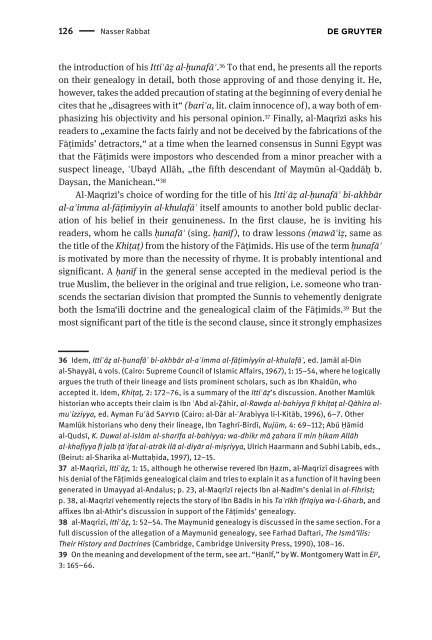0021-1818_islam_98-1-2-i-259
0021-1818_islam_98-1-2-i-259
0021-1818_islam_98-1-2-i-259
You also want an ePaper? Increase the reach of your titles
YUMPU automatically turns print PDFs into web optimized ePapers that Google loves.
126 Nasser Rabbat<br />
the introduction of his Itti^az al-hunafa#. 36 To that end, he presents all the reports<br />
on their genealogy in detail, both those approving of and those denying it. He,<br />
however, takes the added precaution of stating at the beginning of every denial he<br />
cites that he „disagrees with it“ (bari#a, lit. claim innocence of), a way both of emphasizing<br />
his objectivity and his personal opinion. 37 Finally, al-Maqr\z\ asks his<br />
readers to „examine the facts fairly and not be deceived by the fabrications of the<br />
Fatimids’ detractors,“ at a time when the learned consensus in Sunni Egypt was<br />
that the Fatimids were impostors who descended from a minor preacher with a<br />
suspect lineage, ^Ubayd Allah, „the fifth descendant of Maymun al-Qadda1 b.<br />
Daysan, the Manichean.“ 38<br />
Al-Maqr\z\’s choice of wording for the title of his Itti^az al-hunafa# bi-akhbar<br />
al-a#imma al-fatimiyyin al-khulafa# itself amounts to another bold public declaration<br />
of his belief in their genuineness. In the first clause, he is inviting his<br />
readers, whom he calls hunafa# (sing. hanif), to draw lessons (mawa^iz, same as<br />
the title of the Khitat) from the history of the Fatimids. His use of the term hunafa#<br />
is motivated by more than the necessity of rhyme. It is probably intentional and<br />
significant. A hanif in the general sense accepted in the medieval period is the<br />
true Muslim, the believer in the original and true religion, i.e. someone who transcends<br />
the sectarian division that prompted the Sunnis to vehemently denigrate<br />
both the Isma‘ili doctrine and the genealogical claim of the Fatimids. 39 But the<br />
most significant part of the title is the second clause, since it strongly emphasizes<br />
36 Idem, Itti^az al-hunafa# bi-akhbar al-a#imma al-fatimiyyin al-khulafa#, ed. Jamal al-Din<br />
al-Shayyal, 4 vols. (Cairo: Supreme Council of Islamic Affairs, 1967), 1: 15–54, where he logically<br />
argues the truth of their lineage and lists prominent scholars, such as Ibn Khaldun, who<br />
accepted it. Idem, Khitat, 2: 172–76, is a summary of the Itti^az’s discussion. Another Mamluk<br />
historian who accepts their claim is Ibn ^Abd al-Zahir, al-Rawda al-bahiyya fi khitat al-Qahira almu^izziyya,<br />
ed. Ayman Fu#ad Sayyid (Cairo: al-Dar al-^Arabiyya li-l-Kitab, 1996), 6–7. Other<br />
Mamluk historians who deny their lineage, Ibn Taghr\-Bird\, Nujum, 4: 69–112; Abu 0amid<br />
al-Quds\, K. Duwal al-<strong>islam</strong> al-sharifa al-bahiyya: wa-dhikr ma zahara li min hikam Allah<br />
al-khafiyya fi jalb ta#ifat al-atrak ila al-diyar al-misriyya, Ulrich Haarmann and Subhi Labib, eds.,<br />
(Beirut: al-Sharika al-Mutta1ida, 1997), 12–15.<br />
37 al-Maqr\z\, Itti^az, 1: 15, although he otherwise revered Ibn 0azm, al-Maqr\z\ disagrees with<br />
his denial of the Fatimids genealogical claim and tries to explain it as a function of it having been<br />
generated in Umayyad al-Andalus; p. 23, al-Maqr\z\ rejects Ibn al-Nad\m’s denial in al-Fihrist;<br />
p. 38, al-Maqr\z\ vehemently rejects the story of Ibn Bad\s in his Ta#rikh Ifriqiya wa-l-Gharb, and<br />
affixes Ibn al-Ath\r’s discussion in support of the Fatimids’ genealogy.<br />
38 al-Maqr\z\, Itti^az, 1: 52–54. The Maymunid genealogy is discussed in the same section. For a<br />
full discussion of the allegation of a Maymunid genealogy, see Farhad Daftari, The Isma‘ilis:<br />
Their History and Doctrines (Cambridge, Cambridge University Press, 1990), 108–16.<br />
39 On the meaning and development of the term, see art. “0an\f,” by W. Montgomery Watt in EI 2 ,<br />
3: 165–66.


